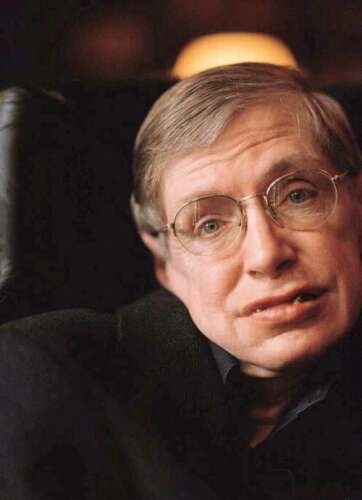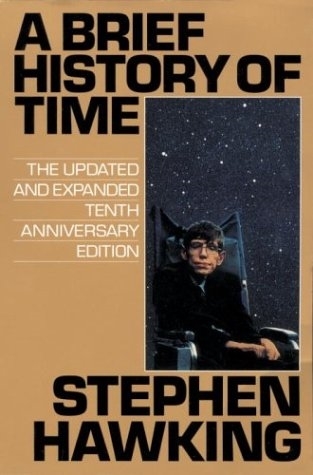 |
| Professor Stephen W. Hawking's portrait (from Hawking's official website, www.hawking.org.uk, on the biography page.) |
Stephen Hawking once wrote that due to his affliction by ALS, or amyotrophic lateral sclerosis, "I was able to feed myself, and get in and out of bed" only “up to 1974." At this time Hawking was a young adult, but this did not deter him from working toward a bright future.
Born on January 8th, 1942 in Oxford England, Hawking was a bright, yet clumsy child (Hawking). After moving all the way to St. Albans near London at eight years of age, Hawking graduated from his local elementary school, junior high, high school, and eventually the local four-year college, only barely able to snatch a first class honors in physics (Larsen). He went on to be accepted by Cambridge University, receiving his doctorate in1966. He continued to research there, and was eventually appointed Lucasian Professor of Mathematics, a title once held by Sir Isaac Newton, which he held from 1979 till 2009.
Presently, he works as the Director of Research at the Centre for Theoretical Cosmology, at DAMTP, in Cambridge. Certainly this hard work merits recognition and praise, but heroes are not only made of their personal success. All heroes must possess a strong influence upon others to be able to spread the word of their great works or philosophies. Without influence, heroes' efforts would be as short-lived as themselves. Heroes also require a strong will or perseverance to guide them through the adversities created by this world and others. Thus, Professor Stephen Hawking deserves the designation of “Hero” for his great influence, which he uses to educate and inspire the world, and for the sheer amounts of will power and perseverance he continually demonstrates.
 |
| One of Hawking's popular novels, published in 198 (http://www.hawking.org.uk/) |
Professor Hawking is a hero because he has become one of the most credible, influential scientific minds in the world. He may be most respected for his findings and research which we can only begin to comprehend; one example being when the professor successfully "worked to combine quantum mechanics and gravity into a single unified theory (Larsen)." Having bested even Einstein, the name synonymous to physical science, by calculating and reasoning the connection between the forces that apply in both miniscule and gargantuan interactions, Professor Hawking stands as a strong authority in the field of theoretical physics. Also, since the subjects of Professor Hawking's research are too distant, massive, or infinitesimal to physically study or demonstrate, he can use only his mind to come up with these ideas and support them far beyond any reasonable doubt, giving him a steadfast toehold in the ever changing world of science. To spread these astounding ideas, Hawking has gained a large following by writing three international best-selling books and having received "numerous prestigious awards, including the Royal Society's Copley Medal, the Gold Medal of the Royal Astronomical Society, and the American Presidential Medal of Freedom (Larsen)." The three books were especially effective in popularizing Professor Hawking, because in addition to the facts, theories, and postulates, there were little personal notes about the author that enticed many to read the publications (Hawking). In addition to these books, the numerous awards granted to Hawking over the years gifts him instant merit if one would be wanting information of that nature, making the Professor more reliable than most. The Professor's life in public gives him instant honor and respect, yet his personal experiences and difficulties may be the most heartening aspect of this hero.
As well as possessing a strong force in the movement of the field of science, Hawking has an undeniably strong will to persevere to reach success in life. Despite nearing the age of seventy, Hawking, "continues to combine family life (he has three children and three grandchildren), and his research into theoretical physics together with an extensive programme of travel and public lectures." (Ley) While most folks slow down tremendously in their sixties, Hawking is still running full-speed ahead, still excelling in both his professional career and role as a loving grandfather. Also, Hawking shows extra effort in spreading his ideas by giving many public lectures in various locations in preference to only teaching to students at his long-time home and college, Cambridge University. Probably the best example of the Professor's strong will is his reaction to contacting the infamous Lou Gehrig's disease, or ALS. Professor Hawking wrote in his official website, "After all, if I were going to die anyway, it might as well do some good. But I didn't die. In fact, although there was a cloud hanging over my future, I found, to my surprise, that I was enjoying life in the present more than before. I began to make progress with my research, and I got engaged to a girl called Jane Wilde..." The disease became debilitating for Hawking in the beginning of graduate school at Cambridge while he was still in his early twenties ("Hawking, Stephen"). He was at an age where learning to function as a full-grown adult is a daunting challenge in itself, but his strong will to try to change the world kept him thinking and working. In fact, his immediate reaction to this major obstacle was almost for the better, with impending death motivating him to full-heartedly take part in his research and to discover a love life while there was still time. Stephen Hawking's ability to bull through his difficulties in life while still maintaining a healthy relationship with family truly sets him apart as an undisputable hero.
Professor Hawking's authority in the field of physical sciences, which was augmented by his use of television, Internet, and his wildly successful books, in addition to his uncanny ability to push through any adversity, have brought him to the proud ranks of those we can consider as heroes. Hawking's radical thinking skills kick started the large following he now has, causing him to appear in various media that make him a household name. After being introduced to him through popular culture, people want to follow up on the work he has done to see why top authorities and scholarly institutions have chosen to decorate him with numerous awards. Also, his ability to act as a caring grandfather despite his many time constraints and physical disabilities merits the title of hero. Stephen Hawking is inspirational because of his ability to cope with the many hardships that came his way, such as his fighting for the first class honors from his four-year school, or when he was first stricken by his disease that prevented him from being able to do most activities on his own. Even as a young adult, Hawking believed that the burden of a restricted, difficult life due to ALS should not affect one’s work habits, so he did what he could to excel in high school and college and ended up with his doctorate a few years later, leading to his successful life-long profession as a theoretical physicist and mathematician. Professor Hawking's life can teach us not only the value of a good education with a strong foundation, but also to work tirelessly to accomplish our goals and aspirations, disregarding the unfair hand our lives have dealt us. He also shows it is paramount to remain loyal and dutiful to friends family, especially in difficult times, especially when he wrote, “I have had motor neurone disease for practically all my adult life. Yet it has not prevented me from having a very attractive family, and being successful in my work. This is thanks to the help I have received from Jane, my children, and a large number of other people and organisations.” ("Prof. Stephen Hawking’s Disability Advice"). Even though we may be experiencing our own 1974, we should still follow in Hawking’s footsteps and act with the same strong character and dedication he demonstrates so that we may lead the world to a better future.
Works Consulted
Larsen, Kristine M. "Hawking, Stephen William." World Book Advanced. World Book, 2011. Web. 27 Mar. 2011.
Ley, Nicki. "Prof. Stephen Hawking’s Biography." Professor Stephen Hawking . N.p., 03/03/2010. Web. 28 Mar 2011. <http://www.hawking.org.uk/index.php/about-stephen>.
Hawking, Stephen. "Prof. Stephen Hawking’s Disability Advice." Professor Stephen Hawking . N.p., 03/03/2010. Web. 30 Mar 2011. <http://www.hawking.org.uk/index.php/disability/disabilityadvice >.
"Hawking, Stephen." UXL Encyclopedia of World Biography. Ed. Laura B. Tyle. Vol. 5. Detroit: UXL, 2003. 860-862. Gale Virtual Reference Library. Web. 24 Mar. 2011.
"Hawking, Stephen W. 1942–." Concise Major 21st Century Writers. Ed. Tracey L. Matthews. Vol. 3. Detroit: Gale, 2006. 1663-1669. Gale Virtual Reference Library. Web. 30 Mar. 2011
Page created on 4/28/2011 12:00:00 AM
Last edited 8/1/2018 3:28:39 PM
